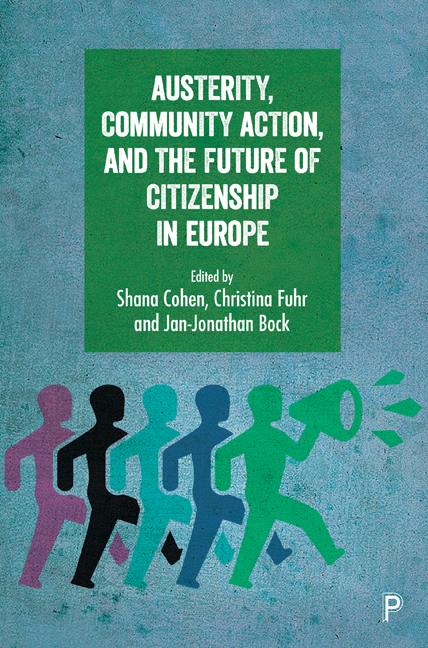Book contents
- Frontmatter
- Dedication
- Contents
- Acknowledgements
- Notes on contributors
- one Introduction: social activism, belonging and citizenship in a period of crisis
- Part I The social consequences of welfare policy
- Part II The practice of social good
- Part III Social change and neoliberalism
- Part IV Situating solidarity in perspective
- Index
Sixteen - Conclusion: citizenship, community and solidarity at the end of the welfare state
Published online by Cambridge University Press: 05 April 2022
- Frontmatter
- Dedication
- Contents
- Acknowledgements
- Notes on contributors
- one Introduction: social activism, belonging and citizenship in a period of crisis
- Part I The social consequences of welfare policy
- Part II The practice of social good
- Part III Social change and neoliberalism
- Part IV Situating solidarity in perspective
- Index
Summary
In May 2016, a revealing encounter took place at the Social Democratic Party's (SPD) conference on social justice in Berlin. The party leader, Sigmar Gabriel, discussed labour conditions with a female cleaner, Susanne Neumann. In front of hundreds of SPD members and dozens of television cameras, Neumann attacked precarious working conditions. She told Gabriel that the SPD had become unelectable for many working-class voters because of Chancellor Gerhard Schröder's labour market deregulation and crippling welfare cuts in the early 2000s. She called for the neoliberal reforms to be reversed. “You changed the law so that people can be hired on short-term contracts,” she accused Gabriel, “and in my sector, everyone is on short-term contracts now. People don't get a chance.” She elaborated:
“These guys get a six-month contract. If they have to take any sick leave, or if someone tells their boss that they are union members, or if they ask for overtime pay, the contract is not extended. Young people start their working lives with these short-term contracts. That means that no landlord lets you rent a flat; you don't get a bank credit to purchase anything and design your home. We are being domineered, and it creates frustration and anger. So why should I vote for a party that caused this situation and doesn't have any solutions?”
Neumann accused the SPD of promoting a two-tier system that creates a hierarchy between workers on open-ended contracts and those on short-term ones. She disclosed that she would have to take early retirement soon, because of cancer. After 38 years of work, Neumann revealed, she will receive a monthly pension of 725 euros (around £600 sterling in mid-2016):
“If I didn't have my husband, I would have to ask the job centre for a top-up. That basically means stripping naked. ‘How big is your flat? How much do you have in savings?’ In Germany's constitution, it says that human dignity is sacred. But I have worked hard my entire life – I never took any money from the state. Then you get into that kind of situation, because of illness, and the state does not support you.”
Gabriel barely featured in the exchange. It was apparent that the audience's sympathies were with Susanne Neumann.
- Type
- Chapter
- Information
- Austerity Community Action and the Future of Citizenship , pp. 277 - 288Publisher: Bristol University PressPrint publication year: 2017

